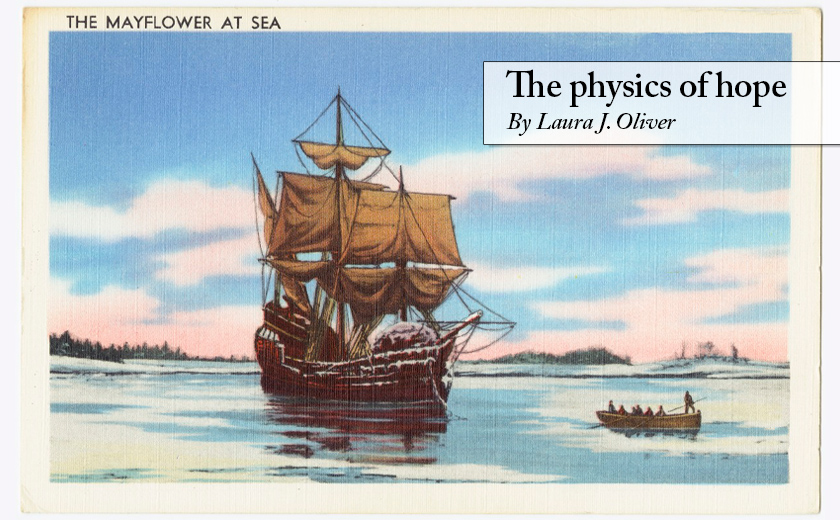Human beings claim to be the only species on the planet capable of feeling awe. I’d add to that distinction an amazing capacity to hold contradictory beliefs and experiences simultaneously.
The Trinity comes to mind.
That we will laugh again after a devastating loss.
That we are divine in origin yet hurt each other every day.
That light is both a wave and a particle.
A lot of things in my life feel contradictory, such as irreparable rifts with people I love. Case in point: Aren’t “love” and “irreparable” contradictory?
And the election feels like this to a lot of us. People we are related to, people whose company we enjoy, and people we respect did not vote as we did. And that feels contradictory. How can I like you so much and not think the same way? It’s funny, isn’t it? It’s easier to accept a difference in spiritual beliefs than this political one. Wait. It is a difference of spiritual beliefs. And it’s not easier. And ironically that’s what brought my ancestors and perhaps yours here in the first place.
In visiting a first cousin who lives in England last summer, I discovered that her husband, a research historian with time on his hands, had documented our grandmother’s family tree back to the Mayflower. Our 10th great-grandfather, Francis Cooke, and his son John, had boarded the Speedwell, which set sail with the Mayflower on August 5, 1620, but Speedwell leaked so badly they had to turn back for refitting. Both ships set out a second time, with Speedwell leaking so badly that again, both ships turned back just 100 leagues past Land’s End, and Speedwell was sold. Twenty people returned to London, but eleven passengers from Speedwell boarded the Mayflower. (Ultimately, the leaks proved to have been sabotage by sailors trying to escape their year-long contracts.) Francis and John entered Cape Cod Harbor on November 11, 1620, so I’m guessing they participated in the first Thanksgiving. In 1621, however, Thanksgiving was simply a meal shared with the Wampanoag to celebrate a bountiful harvest.
The celebration had no religious context for the first couple of years, then it occurred to the grateful they should be thanking the divine. That annual tradition continued informally for over 200 years until President Abraham Lincoln issued an official proclamation in 1863 designating Thanksgiving as our annual national day of gratitude. A day all the states were to stop and give thanks in the middle of a war to dissolve their union….
And in what feels to be a further contradiction, this same President had signed off on the largest mass execution in the nation’s history not two years before, hanging 38 boys and men who fought for their tribal lands in the Sioux Uprising. It was the day after Christmas 1861. The decision and the vision defy imagination.
Even more contradictory, Lincoln commuted the sentences of 262 similarly convicted warriors, studying the evidence in each man’s case and absolving them one at a time.
We had united in arms to free ourselves from a monarchy only 88 years before, yet here we were already in the middle of a Civil War, half of us trying to break that union and half to preserve it. During this time of contradictory alliances, even within the same family, Lincoln freed the slaves, executing one minority and liberating another.
Human beings are complex, which means humanity is complex. How could it be otherwise? We are driven by neural wiring, hormones, cultures, personalities, the damage we carry, maybe by the very stars under which we were born.
Your nose is pressed against the glass of now, staring through the present at a future that is yet to be determined. In quantum physics, we could say we are in superposition, which is a phenomenon where an object (the future) has the potential to occupy multiple different states at once, but the object’s actual state is unknown. It’s everywhere and nowhere. In essence, anything could happen because the future is only a wave of could-be.
Although we do not understand why, observing the wave collapses the wave. The wave becomes particles— the stuff of matter, the stuff of which stars are made, we are made, and from which everything we call future follows.
Consciousness is creative. Attention is a powerful tool. Where will you place yours?
How many miracles have you experienced in your life? Every one of them, by definition, contradicted circumstances. The impossible happened! Inexplicably, against all odds—from no way, a way appeared.
Mom used to look at me when I was grieving over a loss and say, “Life is long.” Other times, presented with the same situation, the response was, “Life is short.” And both were true.
The rift in our nation has a lot of people satisfied that we have corrected our course and others struggling to believe we are going to be okay. I stand in remembrance that we have healed once before, when the red and the blue were the blue and the grey. I’m in awe.
Place your attention on truth and hope, beloveds.
The future is in superposition.
Collapse the wave.
Laura J. Oliver is an award-winning developmental book editor and writing coach, who has taught writing at the University of Maryland and St. John’s College. She is the author of The Story Within (Penguin Random House). Co-creator of The Writing Intensive at St. John’s College, she is the recipient of a Maryland State Arts Council Individual Artist Award in Fiction, an Anne Arundel County Arts Council Literary Arts Award winner, a two-time Glimmer Train Short Fiction finalist, and her work has been nominated for a Pushcart Prize. Her website can be found here.

